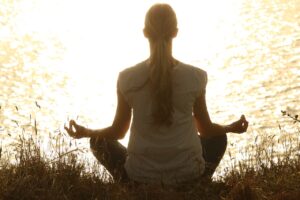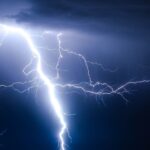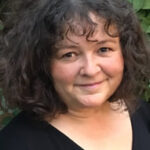Reflections on the completion of #MeToo: Counsellors and psychotherapists speak about sexual violence and abuse
By Emma Palmer
It was reassuring hearing the title of Babette Rothschild’s (2000) book all those years ago, recommended to me by my core process psychotherapist. ‘The body remembers’. Yes, it does, my body, turning towards me, nodding – suddenly engaging – a door opening inside.
 The body remembers. This body remembers, and what a journey it’s been – so far – in my body stepping through that door and in deepening my understanding of trauma and working with trauma in myself, with clients, with supervisees, and with trainees.
The body remembers. This body remembers, and what a journey it’s been – so far – in my body stepping through that door and in deepening my understanding of trauma and working with trauma in myself, with clients, with supervisees, and with trainees.
That feels like a lifetime ago. What did my body remember then? I was nearly 20 years younger, in my very early thirties. I was training as a therapist. I knew I wanted to go on and train in a body or somatic-oriented therapy, but I didn’t then know what or when. The body remembers how I was in the process of letting go of my father who had a chronic form of leukaemia – a dis-ease of slow sadness, fading, and withering. The body remembers the quiet moments noticing his skin suddenly papery, his waistbands loosening, wisps of his hair left behind on the cushions of the sofa. The body remembers this quiet intimacy punctuated by the busy times of oncology visits, gloved nurses and, afterwards, nights driving home gazing at the people on the Gloucester road, a busy thoroughfare in North Bristol: laughing, drinking, chatting, feasting, walking. Living.
The body remembers how stretched, re-arranged, scared, fascinated, confused and enthralled I was in training as a therapist. I’m so glad I did it then, cos I’m not sure I have the energy to do it now, working so hard on all fronts: experientially and in the moment, intellectually, reflectively, relationally, whilst working hard to raise the cash.
The body remembers my Dad’s death, a few weeks before I finished my therapy training. One-minute sitting quietly in the garden, sipping cranberry juice next to the blood-red crocosmia flowers, the next, the horror of being gripped by septic shock. The body remembers his heating, contorting body and gasping for breath. The body remembers the sudden stillness after his last, long outbreath a few hours later, his body unwinding. The body remembers the sudden blossom of blood on the starched white sheets as they pull out a line in his groin. It is shocking in its stark beauty (so red and alive).
 My meditating body remembers the relief, amidst the grief, of the moments when I could sit still, wanting and waiting for nothing. Awash with my own grief the day after my Dad died, I wandered around the beautiful garden surrounding my Nan’s nursing home – we had just broken to her the news. I felt united with all the other daughters around the world grieving for their fathers that day. We’re all born, we live, we die. It’s so ordinary, yet extraordinary when it happens to us. I listened to Puccini arias wherever I went, something I had discovered after my other Nana’s death a few years earlier, helping my heart to stay moist and open. The lover body remembers. A couple of years earlier I’d fallen in love with Justin, the tall man I still live with, whom I’m marrying this autumn/fall. The body remembers the heart leap the first time we spoke 25 years ago, a faint stirring in my body memory – have we met before? A quarter century of friendship, two decades of sharing our lives, our plans, our bodies, arguments, a garden, friends, families, travels, a faith – if a Buddhism is one – I’m never too sure. The body remembers too many things to name. Today it is gratitude; cupped palms filled with warm liquid gold.
My meditating body remembers the relief, amidst the grief, of the moments when I could sit still, wanting and waiting for nothing. Awash with my own grief the day after my Dad died, I wandered around the beautiful garden surrounding my Nan’s nursing home – we had just broken to her the news. I felt united with all the other daughters around the world grieving for their fathers that day. We’re all born, we live, we die. It’s so ordinary, yet extraordinary when it happens to us. I listened to Puccini arias wherever I went, something I had discovered after my other Nana’s death a few years earlier, helping my heart to stay moist and open. The lover body remembers. A couple of years earlier I’d fallen in love with Justin, the tall man I still live with, whom I’m marrying this autumn/fall. The body remembers the heart leap the first time we spoke 25 years ago, a faint stirring in my body memory – have we met before? A quarter century of friendship, two decades of sharing our lives, our plans, our bodies, arguments, a garden, friends, families, travels, a faith – if a Buddhism is one – I’m never too sure. The body remembers too many things to name. Today it is gratitude; cupped palms filled with warm liquid gold.
The body remembers – though we haven’t been here before, have we, body? – how it’s so true that midlife, this year approaching 50, is as much about undoing and unlearning things I so enthusiastically sought in my 20s and 30s as I continue to create, listening to this new-old body entering late summer. Today golden light, abundance, gentle harvesting, tears, unbecoming, and poignancy. Other days angry hot flashes, sleepless nights and shocks of blood so red and alive, but today, let the softening golden light be there.
The body remembers that I’m old enough now. I never felt old enough, I was always so damned eager to be older, hating being a child, wanting to leave home from the age of seven, even though I was deeply suspicious of the world of ‘grown-ups’. I realise I am happy to be the age I am. I am glad I reached here.
The body remembers that I felt old enough to say ‘#MeToo’ back in the October of 2017, at 46. ‘Enough of this shilly-shallying!’ – my Nan is suddenly inside my head and I need to google shilly shallying, but I know she means something like ‘move it on’ ‘let it go’ etcetera, and in her mind’s eyes she’s waving a tea towel to emphasis her impatience. Maybe I said #MeToo because I felt old enough – am old enough – to stand tall, stand together, make a noise in saying #MeToo and in finding ways to ensure that #TimesUp.
 The body remembers the bolt of terror that shot through me a little over two years ago as I read an email from my colleague, Deborah, inviting me to co-edit a book for counselling and psychotherapy in the wake of the #MeToo movement. I knew I’d say yes, a gut yes, deep down, red, getting ready to glow, like the ‘on air’ light outside a recording studio. Do I have anything useful to say about this myself? In an hour I wrote words, enough words to form a chapter, words which are true, words which weave together all the suffering – sexual abuse, war, ecocide, all the mess in our over-simplified, still victim-blaming patriarchal culture, brutalising everyone and everything. Pull one thread and you have a ‘victim’, pull another and you have a perpetrator. The words turned into a chapter ‘Dirty secret, ecocide and the specialness of the world all around’.
The body remembers the bolt of terror that shot through me a little over two years ago as I read an email from my colleague, Deborah, inviting me to co-edit a book for counselling and psychotherapy in the wake of the #MeToo movement. I knew I’d say yes, a gut yes, deep down, red, getting ready to glow, like the ‘on air’ light outside a recording studio. Do I have anything useful to say about this myself? In an hour I wrote words, enough words to form a chapter, words which are true, words which weave together all the suffering – sexual abuse, war, ecocide, all the mess in our over-simplified, still victim-blaming patriarchal culture, brutalising everyone and everything. Pull one thread and you have a ‘victim’, pull another and you have a perpetrator. The words turned into a chapter ‘Dirty secret, ecocide and the specialness of the world all around’.
The body remembers the relief to see those words on the page. There is comfort in that they remind me of the words I often wrote in my ‘Bodywise’ pieces for Somatic Psychotherapy Today. Spontaneous, experiential, visceral. Sometimes more theoretical and slower in their reflection. I say yes to Deborah the co-editor. Off we go.
The body remembers the moment of realising the mountain-like size of the task ahead. There’s always a moment like that for me, with books, and yet this time we’re including more than 23 other voices! I’m up for the challenge as we start to hike. The body remembers the appreciation, joy, horror, confusion, love in reading those voices saying #MeToo as the chapters started rolling in. The body remembers – a lot and often – the awe of how we not only ‘survived’ but thrived enough to be here, writing this book, in good company, people doing so many good things in the world.
The body remembers and carries the shadow through this whole writing and editing phase – how so many people don’t make it, don’t have the good company, the support, the care they need to literally survive. The body remembers the times when I nearly didn’t make it – pushing off rocks into the sea, an oceanic oblivion. As I write and co-edit this book I feel the depth, the height and the density of the shadows around us, collectively failing to face up to how sexual abuse and violence are ‘normalised’, shrouded in a conspiracy of silence, and stifling the lives of those who ‘survive’.
The body remembers the newly found strength of standing together, safety in numbers, on more solid ground. I’m not alone. It isn’t my shame. I didn’t get it wrong. I couldn’t have done any more than I did. I didn’t betray her, he did, they did. I am not wrong; I am not dirty. The body remembers. Fragments, sobs, night terrors, comfort-eating. I start to look, to look out. To breathe more deeply. I can see, I can feel. It’s dizzy making at first – we’ve reached the top of the mountain, the air is cleaner, I can see the horizon. I can gradually take in the view in this looser, more receptive phase of unbecoming and unlearning.
The body remembers my early hopes for this book. That it adds nuance and depth to the #MeToo movement, particularly since it went viral in 2017. Adding to what Tarana Burke originated in 2006, raising awareness of the sexual violence and abuse inflicted on those at the margins. I long for more of us to stand together – beyond Hollywood actresses – and more of the time, in creating cultures and conversations in which dialogues happen, learning happens, new channels of communication open up, reconciliation happens, justice is found that doesn’t further traumatise the already abused and violated. I long for us to do the collective cultural work, healing collective traumas of colonisation, war, and the ongoing, socially acceptable forms of violence and abuse embedded in our culture in terms of racism, victim-blaming , ecocide, and militarism, to name just a few.
The body remembers the feeling of nearing an end and meeting a beginning. The two years of writing and editing has been intensely creative, intensely harrowing, intensely soul-searching, and intensely bonding to life. The process is almost complete. The undoing and unbecoming, it’s exhilarating, on this mountain top, feet firmly planted on the earth. The body remembers this strange bardo, familiar, yet not experienced for some while, of this shared book- baby leaving my hands, on the cusp of crossing a threshold and becoming everyone elses’ book – or, at least, the ‘everyone else’ who care to read, to learn, to heal, and to act.
NB – #MeToo book details:
#MeToo: Counsellors and psychotherapists speak about sexual violence and abuse will be published on PCCS books on 14th May 2020. Available to pre-order from 1st April 2020 – ISBN 978 1 910919 53 8 www.pccs-books.co.uk
Reference:
Rothschild, B. (2000). The Body Remembers: The Psychophysiology of Trauma and Trauma Treatment. NY: W. W. Norton & Company.
 Emma Palmer has been practising as a therapist since 2003. She works as a BACP accredited counsellor, a relational body psychotherapist, supervisor, and ecopsychologist. She is drawn to working at the meeting place of therapy, social justice, ecopsychology, climate emergency and the wisdom of contemplative traditions. Previously a steering group member of Psychotherapist and Counsellors for Social Responsibility (PCSR) and editor of its Transformations journal, she has been an educator since she was 24, teaching postgraduate international development studies at Bristol University, working with NGOs in Africa, and more recently offering wild therapy, ecopsychology public talks and workshops and leading retreats. She has authored three books under her former name, Kamalamani and is widely published. She has been a student of Buddhism since 1995. www.kamalamani.co.uk
Emma Palmer has been practising as a therapist since 2003. She works as a BACP accredited counsellor, a relational body psychotherapist, supervisor, and ecopsychologist. She is drawn to working at the meeting place of therapy, social justice, ecopsychology, climate emergency and the wisdom of contemplative traditions. Previously a steering group member of Psychotherapist and Counsellors for Social Responsibility (PCSR) and editor of its Transformations journal, she has been an educator since she was 24, teaching postgraduate international development studies at Bristol University, working with NGOs in Africa, and more recently offering wild therapy, ecopsychology public talks and workshops and leading retreats. She has authored three books under her former name, Kamalamani and is widely published. She has been a student of Buddhism since 1995. www.kamalamani.co.uk
Photo Credits:
Door Elden Miller from Pixabay
Meditating Pexels from Pixabay
Lightening Free Photos from Pixabay
Mountain Free Photos from Pixabay








